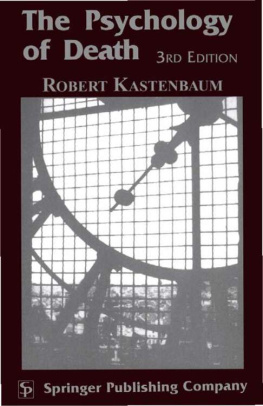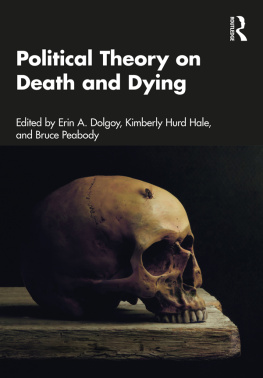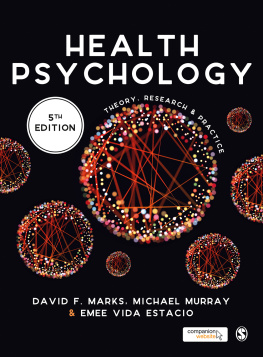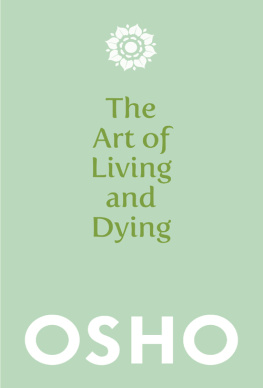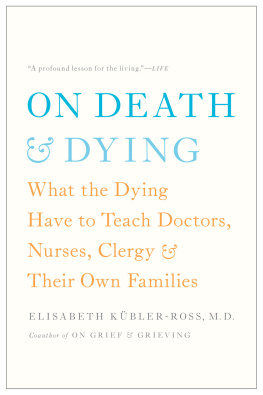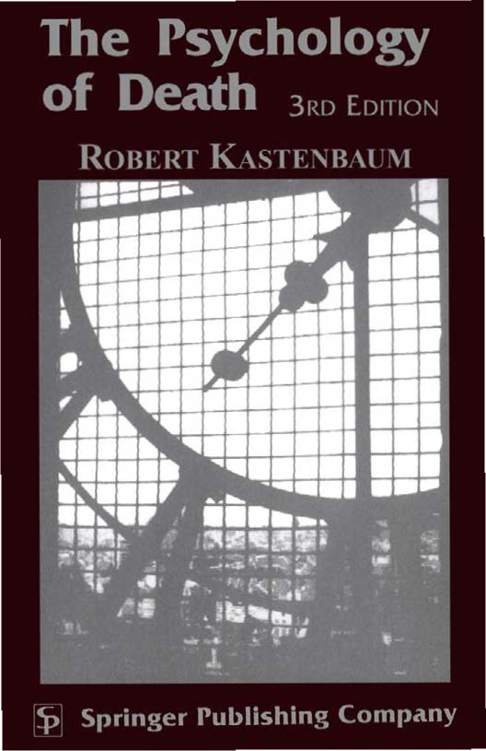Robert Kastenbaum, PhD, completed his doctoral studies in clinical psychology at the University of Southern California in 1959, a year that also saw the publication of Herman Feifel 's pioneering book, The Meaning of Death, to which Dr. Kastenbaum contributed the chapter: "Time and Death in Adolescence." From that time to the
present, Dr. Kastenbaum has been studying the encounter with death in many of its forms. These studies include a major research and demonstration project with hospitalized geriatric patients, the National Hospice Demonstration Study, and, currently, explorations of deathbed scenes in reality and in fantasy. He has worked closely with terminally ill, grieving, and suicidal people and their caregivers, and served as director of a geriatric hospital. Dr. Kastenbaum has been honored for his contributions to death education and research by the Association for Death Education and Counseling, and the National Center for Death Education. He has served as president of the American Association of Suicidology and held offices in the American Psychological Association and Gerontological Society of America. Dr. Kastenbaum served as editor of Omega, Journal of Death and Dying; is senior editor of Encyclopedia of Death; and has written numerous articles, chapters, books, and plays. He is a professor in the Department of Communication, Arizona State University.
The Psychology of Death
THIRD EDITION
ROBERT KASTENBAUM, PhD
Copyright 2000 by Springer Publishing Company, Inc.
All rights reserved
No part of this publication may be reproduced, stored in a retrieval system, or transmitted in any form or by any means, electronic, mechanical, photocopying, recording, or otherwise,
without the prior permission of Springer Publishing Company, Inc.
Springer Publishing Company, Inc.
West 42nd Street
New York, NY 10036
Acquisitions Editor: He/vi Gold
Production Editor: Pamela Lankas
Cover design by James Scotto-Lavino
Library of Congress Cataloging-in-Publication Data
Kastenbaum, Robert. The psychology of death I Robert Kastenbaum.-3rd ed.
p. em . Includes bibliographical references and index . ISBN 0-8261-1300-1 (hardcover )
Death-Psychological aspects. I. Title . BF789.D4K372 199 ' 7-d c
Printed in the United States of America

| Contents |
|---|
| Preface | vii |
|---|
| The Psychologist's Death: A Work in Progress | |
|---|
| How Do We Construct Death? |
|---|
| A Developmental Approach | |
|---|
| Reconstructing Death in Adolescence and |
|---|
| Adulthood | |
|---|
| Death in the Midst of Life | |
|---|
| A Will to Live and an Instinct to Die? | |
|---|
| Dying: Toward a Psychological Perspective | |
|---|
| Deathbed Scenes | |
|---|
| Index | |
|---|
v
'/'his page inlenlionalfy left blank

Preface
There were doubters back in 1972 when people learned that a book was to be published on The Psychology of Death. How could there be a psychology of that? Dead people don't think, feel, behave, or interact, do they? And if there is a life some place else, how would an earthbound psychology know about it? I think now that perhaps these doubters were right, even though the book was well received and is now in this third edition. Psychology has not really told us anything about death. It is telling us a lot, though, about the way we live. As this understanding grows, so does our ability to live wisely and love well our fellow mortals.
Take death ("Please!" as Henny Youngman might have said). Whatever else death might be, it is surely a conception that has been shaped by the human mind-and repeatedly reshaped as we try to become more comfortable with it. We begin, then, with an exploration of "The Psychologist's Death: A Work in Progress" (chapter 1). In this updated chapter we see how psychology has continued to make some progress in dealing with a topic that it had ignored or avoided for many years. I think we still have a long way to go, but it is good to have some progress to report.
Everybody has some progress to report. None of us come into this world with a firm concept of death when we still have so much to learn about life. "How Do We Construct Death? A Developmental Approach" has become a chapter of its own (chapter 2) in this edition, giving us more opportunity to focus on the remarkable experiences and changes that take place from infancy through later childhood. Insights from cognitive and linguistic theorists such as Maxine SheetsJohnstone and Michel Foucault suggest that the child's construction
vi i
of death may be even more crucial a facet of mental and emotional development than previously recognized.
We keep on thinking and rethinking about death after we have passed through childhood's hour. Accordingly, "Reconstructing Death in Adolescence and Adulthood" now has its own chapter as well (chapter 3). Here we learn more about the subtle and pervasive ways in which we manage both to face and turn away from death at the same time. We also draw on additional contributions to the understanding of possible changes in cognitive structure as we move from adolescence through the later adult years and the implications of these changes for our relationship to death. The idea that "I should just die and get it over with" comes in for discussion and leads us to reconsider both suicide and physician-assisted death from that standpoint. New sections on regret theory and denial are also offered. This chapter stops at Nothing. An emerging branch of theoretical physics suggests that everything adds up to nothing. We stop at Nothing, therefore, to glimpse its possible implications for our cognitive understanding of death. However, this stop is only a pause to ready ourselves for a detailed examination of "Death in the Midst of Life" (chapter 4).
Most of the time most of us are not dying. This does not mean, however, that we are free from concern. Some theorists hold that practically everything we do is prompted by fear of death, either directly or by the attempt to conceal and deny such fear. The most influential theories about death anxiety in everyday life have a rather uneasy relationship with the research literature. Here we not only update research contributions, but also examine newer approaches to the role of death anxiety in our psychological functioning: terror management theory and edge theory (the latter in print for the first time). Both terror management and edge theory approaches seem to be more amenable to empirical testing than the classic Freudian and Existential theories and may also offer distinctive guidelines to helping us cope with death anxiety. Yes, it's a long chapter, but the research and theory deserve careful attention.
"A Will to Live and an Instinct to Die?" (chapter 5) is certainly an unfashionable title for an unfashionable chapter. Freud's death instinct theory seemed to have had its heart pierced with a wooden stake years ago, but it has remained surprisingly lively in its grave. The questions dealt with in death instinct theory are too important to ignore, I think, even if we are neither satisfied with all of Freud's

